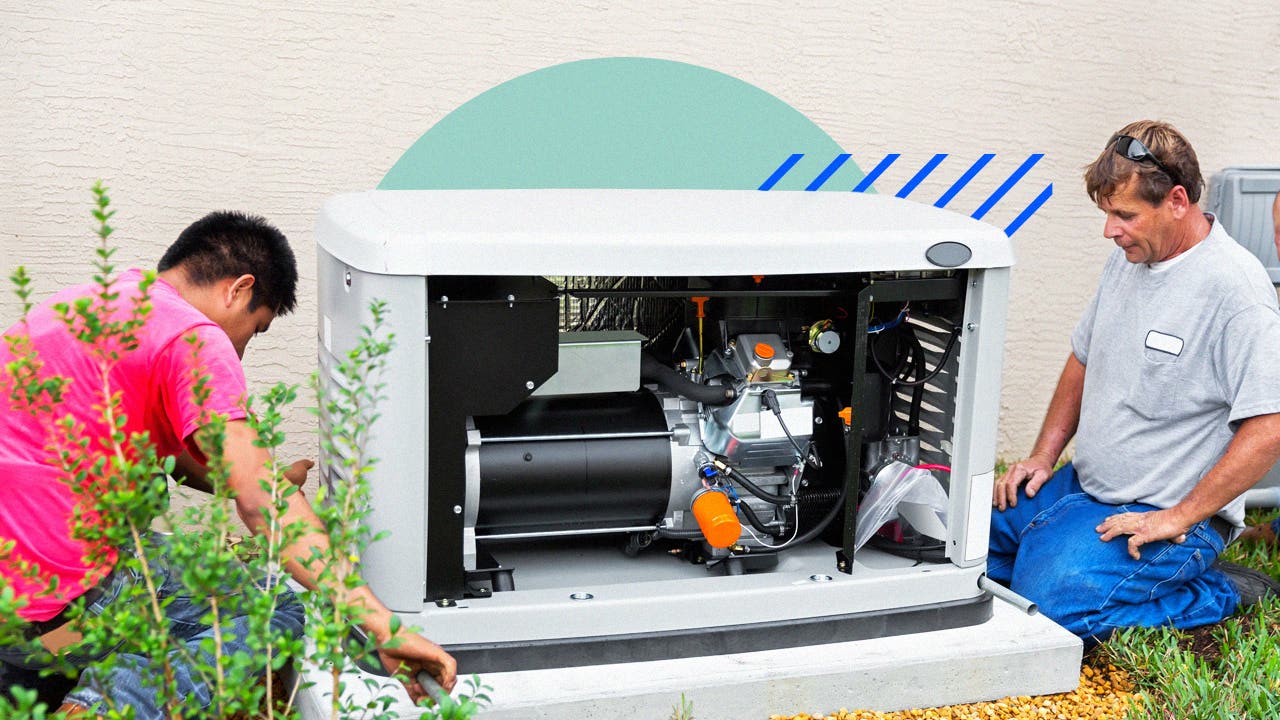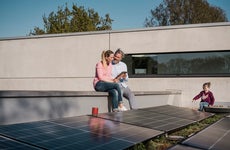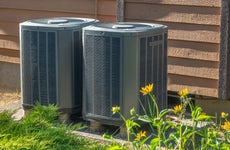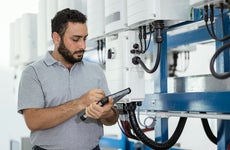Home generators: How much do they cost and should you have one?

The Bankrate promise
At Bankrate we strive to help you make smarter financial decisions. While we adhere to strict , this post may contain references to products from our partners. Here's an explanation for .
Where are you when the lights go out? If you’re at home, you might well find yourself sorely wishing for a backup source of power: namely, a home generator.
Home generators aren’t new, but there may be new reasons to have one — from the increased amount of energy we use working and living at home to the increasing extreme-weather-related strains on municipal power grids.
The national average cost of installing a standby generator runs just under $5,000 in general; $17,000 if you want to cover the entire house. A variety of things influence that cost, from the generator’s size to the type of fuel it uses. Here’s what you need to know.
What is a home generator?
Home generators are machines that convert mechanical energy into electrical energy. They can provide this power directly to appliances, devices and the residence’s electrical system itself, independent of the local power grids.
The capacity of home generators can vary. At the small end are inverter or portable generators, which power a room or a single system for a limited amount of time. Next comes a partial generator, which powers only your residence’s critical systems (like the heat and air conditioning) and/or major kitchen appliances. But for the maximum coverage, you’ll want a whole house generator, which — true its name — can power the entire home. Both partial and whole-house systems are permanent installations that are hardwired directly into the main circuit breaker panel. For that reason, you’ll need a professional electrician to install them.
If a power outage occurs, for whatever reason, the permanent home generator will sense the failure and turn on automatically. That’s why it’s known as a standby generator.
Types of home generators
Home generators have various features, though the most notable one is the type of fuel it relies on to run. Each has its pros and cons. The best one for you is usually the one that is readily available in your area and affordable on your budget.
The most common types of fueled geneator:
Gasoline generators
Average cost: $500-$3,000
Gasoline is typically the most popular type of fuel since it’s readily available and fairly easy to purchase. You can easily go to your local gas station to obtain containers that are five gallons or less.
Keep in mind that you’ll want to store gasoline safely — such as in a detached garage or shed — and well away from ignition sources. If you store the gasoline properly it should last around six months; sometimes longer if you add a fuel stabilizer. Your municipality may have other local regs concerning storage and disposal.
Diesel generators
Average cost: $3,000-$20,000
Diesel is also another accessible source of fuel and can be more energy-efficient than gasoline. It also should be stored in an airtight container well away from sources of ignition. You should be able to store diesel fuel for up to a year, though you might want to add stabilizers and anti-bacterial treatments if storing it longer than six months.
Natural gas generators
Average cost: $2,000-$21,000
One big benefit to natural gas: You don’t have to worry about replenishing it, since you get the fuel by connecting the generator to natural gas pipelines. It’s generally a cleaner fuel source, compared to gas or diesel, too. However, maintenance costs for these types of generators may be higher. Also, homes in areas prone to earthquakes or landslides may want to avoid natural gas, since supplies can get cut off if pipes rupture.
Propane generators
Average cost: $2,000-$21,000
Liquid propane is more common for portable generators, though it can power whole homes too. It can be stored for a longer period than gasoline and diesel — indefinitely, in fact, if it’s stored correctly (and outdoors). Like gas, it’s a cleaner type of fuel.
Solar generators
Average cost: $2,000-$25,000
For those who want a truly green solution, solar generators offer renewable energy — and for free, in a sense. However, if you want to power a whole house generator you may need to install more solar panels to increase the power output. And, as with solar in general, it won’t work as well at night or if it’s snowy or rainy (though most solar-energy systems have back-up batteries for sun-less conditions).
What do home generators cost?
Along with the fuel type, there are many factors that determine how much you’ll pay for your home generator. Here’s a breakdown on specific common costs:
- Transfer switch: It transfers the power from the source (city, energy supplier) to your generator. The cost of a transfer switch ranges from $800 to $2,000 with labor included.
- Concrete pad: It is what your generator sits on and will run you between $250 to $500.
- Permits: Your contractor takes care of this for you, with the costs ranging from $50 to $200.
- Capacity: Portable generators, good for a single space, run $500–$2,000. Partial generators, which can power critical devices or systems, run $3,000–$12,000. Whole home generators run $5,000–$18,000.
- Maintenance: As with your HVAC, you’ll want to do maintenance every year on your generator to ensure it operates at peak performance when you need it. Annual maintenance costs between $80 and $300.
- Installation: Each phase of the installation process has its own costs. Most contractors will assess your site for free or for a nominal service charge. Constructing the concrete pad runs between $50-$75 per square foot. Connecting existing utility lines or adding a fuel tank runs $50-$100 per hour. Making improvements to your wiring or transfer switch prices around $65 to $85 per hour. Finally, equipment and materials are $300-$2,000 depending on the size of the generator.
- Fuel: On average, “portable gas generators cost $30 per day to fuel, while whole-house generators cost between $90 and $220 per day to fuel,“ notes Angie Hicks, chief customer officer at Angi and co-founder of Angi.
Speaking of size, home generators are measured based on the kilowatts (kW) they produce. The more kW your generator produces, the more expensive it will be. To demonstrate, a portable generator, capable of producing between 1-6 kW, costs around $500-$1,800. A generator that produces between 14-18kW (perfect for important components in medium-sized homes) runs between $4,000 to $5,500. Generators that produce 26-32 kW (enough for an entire medium to large home) run between $6,500-$15,000.
What are the advantages of home generators?
Some of the pros of using a generator include:
- Energy in emergencies: “Generators can keep essential safety systems operational, such as security alarms, sump pumps and medical equipment, ensuring the well-being of your household during emergencies,” notes Charlotte Granville, a home remodeling expert with Fixr. You’ll also receive peace of mind that if the power grid goes down for multiple days (like during a natural disaster), your home will still run as usual and computers, TVs and smartphones will still work, keeping you in communication with the outside world.
- Occasional savings: Using portable generators occasionally — like for an outdoor party or TV-binge weekend — can save money on electricity bills.
- Get off the grid: Getting a whole home generator can be useful for those in rural or isolated areas, who are looking to live off the grid or just be less reliant on municipal sources.
What are the disadvantages of home generators?
Some of the cons of using a home generator include:
- Cost: You’re going to need professional installation for a whole home generator, which can add up. Count on labor running 30 to 40 percent of the total project cost. Plus, “generators require regular fuel refills, maintenance, and occasional repairs, adding to the overall costs of ownership,” notes Granville.
- Noise: Depending on the type of generator you buy, it could generate noise, especially when the system attempts to cool itself down.
- May not be eco-friendly: If you’re worried about emissions, getting a gas, diesel or propane generator isn’t considered great for the environment.
And of course, it’s another device to remember and take care of. Says Hicks: “If you notice any issues with your generator, bring in a pro to take a look as soon as possible. What seems like a minor problem could actually turn into something dangerous for you and your home.”
Should you get a home generator?
Generators can be considered important safety equipment. If you live in areas where natural disasters or blackouts are frequent — which, unfortunately, seems to be applying to more and more areas these days — they can be essential to avoid disruptions and danger in your life. Getting a home generator is also a great idea for those who desire to live off the grid.
If you’re unsure of whether you’ll experience enough frequent power outages to justify the cost, you don’t have to go whole hog: a portable or partial generator may be the better option. Keep in mind that they won’t turn on automatically and may not have the power you need to keep all appliances running. But they can still function as a back-up in critical situations.
Related Articles



